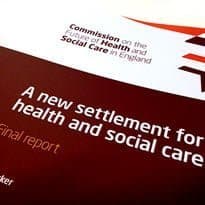Barker calls for joint NHS/care funding
- 4 September 2014

The King’s Fund has called for an end to the split between health and social care in a report that calls for a joint, ring-fenced budget for both and a single commissioner for local services.
The final report of the think-tank’s Barker Commission does not lay out in detail what a new commissioning system would look like or advocate the introduction of new ways of working, such as telehealth or telecare.
However, it argues the patchwork of free NHS and means-tested council services – which imposes different charges on different users in different parts of the country – is “inefficient” and “not equitable.”
It calls for a simpler system, in which all patients with ‘critical’ needs would receive free social care, with an ambition to extend this to those with ‘substantial’ and ‘moderate’ needs.
It argues the changes could be paid for by reducing prescription charges but having them paid by more people, limiting free TV licences and winter fuel payments, and raising National Insurance contributions for the over 40s and those earning more than £42,000 per year.
Kate Barker, the economist, Bank of England and government advisor asked to chair the commission, told a launch briefing that other policy makers and politicians might challenge this mix.
But she said there was an urgent need for a public debate on how to fund health and social care that could not be ducked.
“We have known for a long time that we have an aging population, and politicians have not faced up to that,” she said, arguing that as the financial crisis eased “these issues are going to get more pressing.”
Successive governments have ducked the social care funding issue. New Labour set up a Royal Commission on Long-Term Care, but rejected its recommendations as “unrealistic”.
The present government set up the Dilnot Commission, but in the end only ‘capped’ social care costs at £75,000.
However, both ministers and opposition politicians have shown a renewed interest in integrated care in recent months, focusing on its potential to encourage more efficient ways of working, keep people out of hospital, and cut costs.
At the NHS Confederation’s annual conference this year, both Liberal Democrat care minister Norman Lamb and his Labour counterpart, Andy Burnham, called for joint health and social care commissioning.
Lamb has also promoted the creation of 14 integration ‘pioneers’ to test new ways of working, including shared records, while NHS England used the launch of today's report to launch a 'prospectus' for the latest enhancement to personal budgets – 'integrated personal commissioning'.
The Barker report suggests that a new commissioning system could grow out of local initiatives. However, it is clear that integrated health and social care is not a panacea for funding problems.
It says more money will have to be on health and social care; the choice for politicians is how much will come from the public sector and how much will fall on individuals, and so what the money will be spent on.
Despite, this, Barker insisted that a decent system is affordable. She said the commission’s proposals would see health and social care spending rise to 11%-12% of the Office for Budget Responsibility’s projection for GDP in 2015; which would be in line with most major economies.
Chris Ham, the chief executive of the King’s Fund, said it would do further work on the commission’s single commissioner idea and other proposals, but that it would be challenging politicians to do the same.
“At the moment there is a conspiracy of silence,” he said. "If people do not like [these recommendations], they should work out what the alternatives might be; but not grasping the nettle means services for patients and service users will become worse.”




